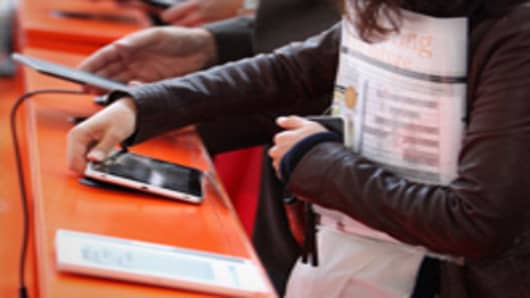The U.S. government filed an antitrust lawsuit against Apple and various major book publishers Wednesday, saying the publishers conspired with Apple to raise retail electronic-book prices to limit competition.
The lawsuit in U.S. District Court in Manhattan said the effort was a response to the success Amazon.com had in selling e-books for just under $10.
The lawsuit said the alleged conspiracy came as Apple was preparing to launch the iPad. It said the alleged conspiracy called for Apple to be guaranteed a 30 percent commission on each e-book it sold.
"To effectuate their conspiracy, the publisher defendants teamed up with defendant Apple, which shared the same goal of restraining retail price competition in the sale of e-books," the lawsuit said.
At the heart of the e-book pricing debate is the industry's ongoing concerns about Amazon.com. Publishers see the "agency model" as their best, short-term hope against preventing the online retailer from dominating the e-book market and driving down the price of books to a level unsustainable for publishers and booksellers.
Since launching the Kindle in 2007, Amazon has made a point of offering best-sellers for $9.99. The discount is so deep from list prices of $20 and more that it's widely believed Amazon is selling the e-books at a loss as a way of attracting more customers and forcing competitors to lower their prices.
Amazon also has been demanding higher discounts from publishers, and stopped offering e-books from the Independent Publishers Group, a Chicago-based distributor, after they couldn't agree to terms.
When Apple launched the iPad two years ago, publishers saw two ways to balance Amazon.com's power: Enough readers would prefer Apple's shiny tablet over the Kindle to cut into Amazon's sales and the agency model would stabilize prices.
Apple's iBookstore has yet to become a major force, but publishers believes the new price model has reduced Amazon's market share from around 90 percent to around 60 percent, with Barnes & Noble's Nook in second at 25 percent. The iBookstore is believed to have 10 to 15 percent.
Apple did not immediately respond to a comment request.


